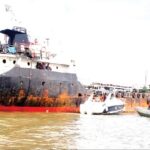STAKEHOLDERS in the maritime sector have identified compliance with Standard Operating Procedures (SOP) driven by comprehensive data as the solution to the myriad of challenges facing the maritime sector in Nigeria.
Rising from the fourth edition of the compliance roundtable organised by the Center for Business Integrity (CBI), in conjunction with the Maritime Anti-Corruption Network (MACN), held in Lagos, the stakeholders held that compliance level to Standard Operating Procedures that are data-driven will eliminate the various challenges facing port operations in the country.
According to Mrs. Magdalene Ajani, Permanent Secretary, Ministry of Transportation, “now is the time to delve into using data-driven compliance to achieve a maritime sector fit-for-purpose.”
Ajani, who was represented by Mr Babatunde Sule, Director, Maritime Services, Federal Ministry of Marine and Blue Economy, stated that, “It is worthy of note that there is no better time than now to delve into using data-driven compliance to achieve a maritime sector fit-for-purpose.
“The ministry, the Independent Corrupt Practices and Related Offences Commission. (ICPC), in collaboration with the Maritime Anti-Corruption Network and Corporation of Business Integrity, Nigeria have galvanised momentum to achieve a maritime sector fit-for-purpose by continuously supporting, sustaining, and institutionalising government-led reform policies that will improve compliance in the maritime domain.”
On his part, the Executive Secretary, Nigeria Shippers Council (NSC). Emmanuel Jime, represented by Mr Moses Fadipe, chairman Port Standing Task Team (PSTT), disclosed that data-informed decision-making for sustainable port reform and strengthened compliance arrangement are required.
“In this era of rapid technological advancement, data has become the lifeblood of progress and innovation. It has the power to transform industries and revolutionize the way we conduct business. Our maritime sector is no exception. By harnessing the power of data, we can unlock valuable insights, make informed decisions, and drive sustainable port reform. It is through this data-informed decision-making approach that we can strengthen our compliance arrangements and propel our sector to new heights.
“Ladies and gentlemen, the theme of today’s discussion, ‘A Maritime Sector Fit for Purpose-Evidence of Data-Driven Compliance,’ encapsulates the essence of our collective aspirations. We recognise that compliance is not an abstract concept but rather an objective that can be measured, monitored, and improved through the strategic utilisation of data. Data-driven compliance provides us with the means to identify areas of weakness, mitigate risks, and enhance our overall operational efficiency. It empowers us to proactively address challenges and ensure that our sector operates in a manner that is transparent, accountable. and aligned with international best practices,” he disclosed.
In his address, Professor Olatunde Babawale, Provost, the Anti-Corruption Academy Of Nigeria (ACAN), pinpointed data as the panacea for the myriad of challenges facing the industry.
In his welcome address, the co-founder of CBI, Mr. Soji Apampa, hailed the Federal Gwovernment for recognising the importance of the maritime industry and creating a dedicated Ministry of Marine and Blue Economy.
“You cannot do trade without paying attention to marine and blue economy. So, this is the crucial engine for rebuilding and giving life once again to Nigeria’s economy as a whole.
So, we celebrate the government of Nigeria on that achievement” he stated.






